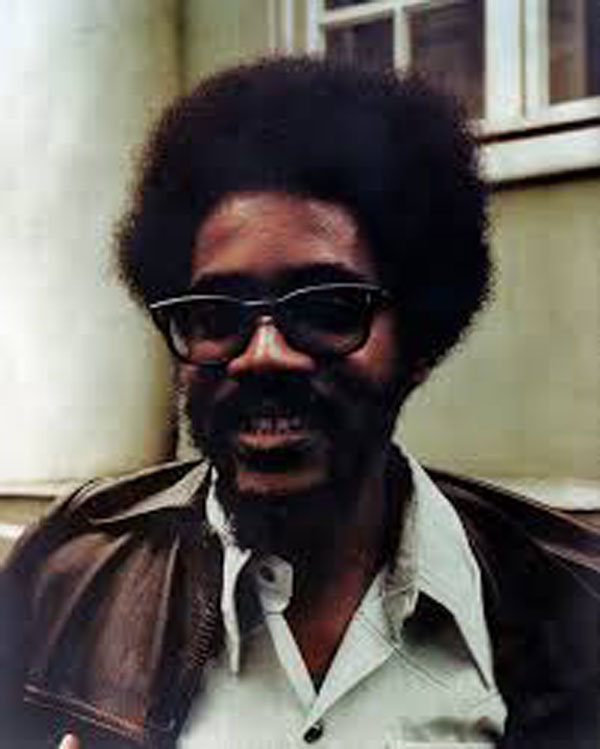
When it rains, the overgrown area floods into a morass, even as vehicles and the brave pedestrian and cyclist, traverse the dangerous road cutting through the vast burial ground, with the ironic French name and vandalised vaults.
Once lined with rows of graceful century palms, the cemetery has been allowed to deteriorate into a disgraceful state over decades of duelling city and State administrations, with occasional bursts of critical financing and goodwill not enough to keep the national site regularly maintained, dignified and clean.
A narrow path leads to the gravesite surrounded by closely-placed concrete balusters, where his symbolically humble white tomb is unadorned except for a small headstone plaque. Some of its black lettering is obscured by the constant coastal weathering, but the lean, bearded, bespectacled visage on either side remains distinct and unmistakable.
“In loving memory of Walter Rodney” it reads, “Husband, Father, Son, Brother… Confidante, Scholar, Revolutionary, Activist,
A believer in his people
He sacrificed in search of truth
Walter Rodney
Through our hearts we feel
Present in our lives today
As he was yesterday
Influencing personalities and decisions
Who we are and become…”
Back in 2015, a billboard nearby, provided a brief history of his short, prolific life, starting: “Dr. Walter Rodney came from a working class family. He was born in Georgetown, Guyana on March 23, 1942 and attended Queen’s College. Rodney became a voice for the under-represented and disenfranchised. His celebrated work How Europe underdeveloped Africa was influenced by his participation in the African Liberation Movement.”
“In 1974 Rodney returned to Guyana where he joined the Working People’s Alliance emerging as the leading figure. On Friday, June 13, 1980, a remote controlled bomb disguised as a walkie-talkie was handed to Rodney by a military officer, the weapon used to assassinate him. The bomb exploded in Rodney’s lap while he sat in a car with his brother in Georgetown, ending his life. He was thirty-eight years old,” it stated in part.
While there were a few word omissions and spelling mistakes, the board acknowledged that he is survived by his wife Dr. Patricia Rodney and his children Shaka, Kanini and Asha, concluding with one of the brilliant historian’s many famous quotations, “If there is to be proving of our humanity, it must be through revolutionary means.”
“If they thought they could assassinate his ideas by assassinating his body, then they were dead wrong. (They) assassinated the man, not his ideas.” his youngest daughter, Asha Rodney, a lawyer, declared on the 41st anniversary of his slaying, observed just over a fortnight ago.
An online public gathering of tributes from around the world was sponsored on June 13 last by the Atlanta-Georgia-based Walter Rodney Foundation, officially run by the Rodney family, a non-profit organisation founded in 2006, which seeks to build capacity and power through political education, activism and engagement. Under the theme “Assassination is no ACCIDENT,” the three-hour long session featured contributions including from his Tanzanian-born daughters, his indefatigable wife, party colleagues and scholars.
“Justice for Rodney is 41 years overdue” the Foundation observed in its poster, under the hashtag #JusticeforRodney. Days before, the 10-month old People’s Progressive Party/Civic (PPP/C) Government finally announced a range of measures to honour his life and legacy, in keeping with the family’s wishes. It has been a long time coming, but Attorney General and Legal Affairs Minister, Anil Nandlall, announced Dr. Rodney’s death certificate will be changed from death by “misadventure” to reflect that he was assassinated, and his gravesite and memorial will be made national monuments although no details have been forthcoming.
He said, “Although this son of Guyana was known and respected throughout the world for his academic accomplishments, scholarship and activism, his death certificate described him as “unemployed’’ as he was denied a job at his country’s only University after working at Universities across the globe. This historical wrong will be corrected and that death certificate will be corrected to read ‘Professor.’”
In February 2014, a Commission of Inquiry was appointed to inquire into and report on, the circumstances surrounding the death of Dr. Rodney. The Report of that Commission was tabled in the House under the successor APNU+AFC Government in 2016, but another motion to implement the Report’s recommendations was defeated.
“This Government hereby commits to move another Motion in this house shortly, seeking the approval of that Report by this House and a resolution that the recommendations contained therein be approved,” Mr Nandlall announced.
The Commission’s records will be digitized by the recently renamed -Walter Rodney National Archives, in collaboration with the Walter Rodney Foundation and the Atlanta University Center – Robert W. Woodruff Library, Atlanta, Georgia, and copies of the same will be housed at that institution as part of the Walter Rodney Papers and Special Collection, he said.
Dr Rodney’s older daughter Dr. Kanini Rodney-Phillips noted: “We are excited to celebrate this victory, but are also filled with mixed emotions, and are still mourning the loss of a father and husband… Justice does not include his return to us in flesh.”
His wife, Dr. Patricia Rodney pointed to four decades of struggle after the State-sponsored assassination, terming the recent news a victory for freedom fighters, according to live tweets from the Foundation. She also thanked the people of Guyana, asserting that her husband focused most on the people of his home country. “Walter was not about accolades, he never wanted to be a martyr, he cared about the people. I’ve never seen someone with such love for the Guyanese working people,” she stressed.
Dr. Rodney added she wants to make sure the Guyanese working people are also compensated and aided in their struggles in this moment. “One thing that Dr (Walter) Rodney’s work was successful in doing, in Guyana, was bringing the races together.”
“Guyana needs a lot of healing… I said the same thing about Grenada: we are not going to proceed without reflection, without healing. We will always have roadblocks. Unless we do that deep grassroots work, we will get nowhere.”
She added that people needed to return to her husband’s roots-based activism to make revolution happen: groundings, meetings and education in people’s homes and on the streets.
“This moment gives us a chance to begin the process of healing, because I don’t think we ever healed… We have survived, but we can now begin to heal.”
ID is moved by what Dr. Patricia Rodney tells her children: “Your father did not leave you any wealth, but what he left you money cannot buy…I think Walter would have been very proud of all our children and grandchildren.”






